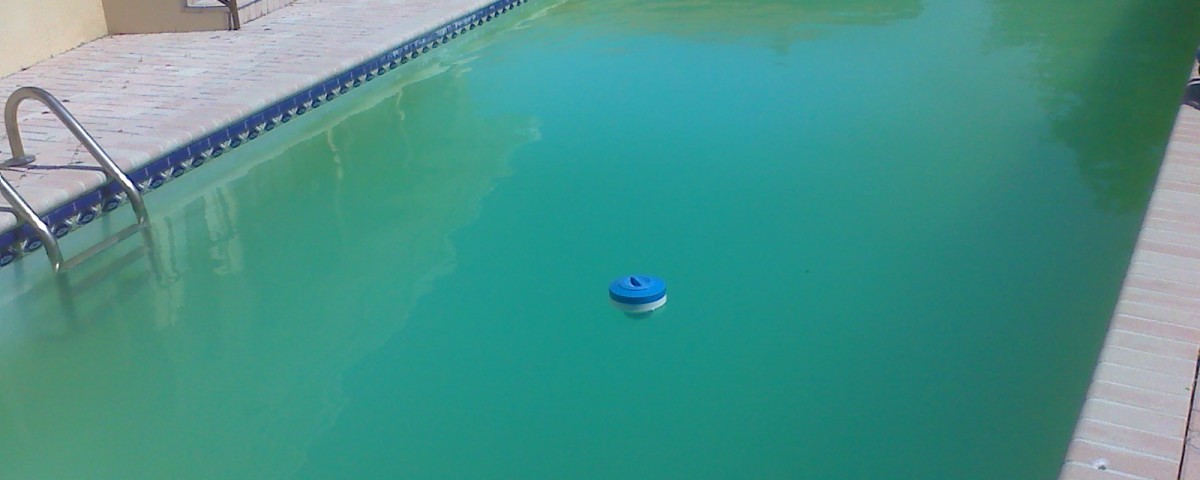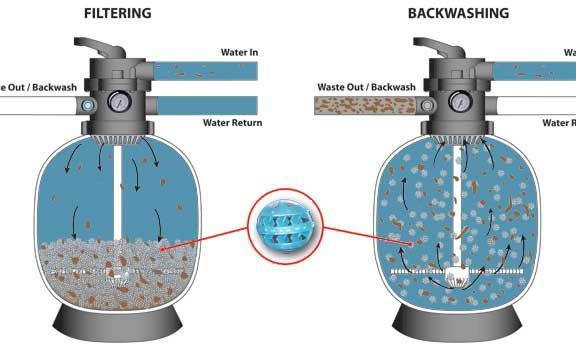While a pool can be a fun and beautiful part of your yard, it can also detract from its beauty. Pool maintenance is generally an underestimated task and expense on a home. It’s very easy for a sparkling oasis to slip into a murky, uninviting pool. Luckily, the solution to cleaning a pool is often not too complicated. The tricky parts comes in diagnosing the problem. For the most part, the issues can be divided into mechanical or chemical issues.
Chemical Imbalance
More times than not the root cause of having a cloudy pool is having a poor balance of chemicals. It’s important to test the chlorine, pH, alkalinity and calcium hardness levels of your pool.
- Chlorine level: There’s a good chance that this will be an indication that your chlorine level is low and you simply need to add more. The amount of chlorine you add should be based on the size of the pool.
- pH level: If the pH is too high (greater than 7.8), the potency of your chlorine is reduced, rendering it less effective. In this case you can use a pH reducer like sodium bisulfate to bring it back down. If you have a gunite pool, you will also want to be concerned with a high pH balance as the acidity can wear on the pool.
- Alkalinity level: Cloudiness will likely occur when the total alkalinity is greater than 2 ppm. In this case chlorine strength is weakened, you can also use a pH reducer.
- Calcium hardness: When calcium hardness of your pool water exceeds 400 ppm and the water temperature is greater than 85 degrees, it’s very likely your pool will become cloudy. You should get a settling agent to reduce the calcium content. Moving forward, be careful to use calcium-based chlorine.
It’s important to note that weather also plays a big role in the chemical composition of pool water. Heavy rains for example dilute the chlorine levels and will thus reduce its potency. Additional use of your pool can also alter the chemical makeup. While family, friends and loved ones taking advantage of the pool is the reason you have it, often times, this takes its toll on the water quality. Dirt, grime and oils from the skin buildup and murk your pool’s water. Additionally if your dogs are entering the water, the water quality will surely be affected.
If you have a DE filter, you may have too much or too little DE powder. Having too much DE powder is more likely to result in a cloudy pool as the access powder blocks proper filtration.
TIP: you can buy clarifiers that specifically work to resolve build-up problems that lead to a cloudy pool. These clarifiers work to take small particles of material and clump them together so they may be caught by your filter.
Mechanical Issue
If all the chemical levels of your pool seem to be in good order and there has been no seasonal or usage changes, you may have a mechanical problem.
- Filter quality: Filters should be cleaned once a month. Dirt can build up in the filter and enter your pool. You may want to consider backwashing your filter.
- Filter size: You’ll want to make sure that your pool’s filter is the right size for your pool. If the filter is too small, you’ll almost surely be getting cloudy water.
- Pump and motor size: Ensure these units are the right size for your filter. If they’re too big or too small will disallow proper filtration.
- Filter usage: It’s important that your filter is running about 8-12 hours per day, every day. You should position the jets so they are most efficiently circulating the water.
When correcting pool maintenance, it is sometimes helpful to call a local pool expert. They will quickly be able to diagnose the problem and provide a solution.
About the Author: South Austin Pool Cleaning is the most trusted pool-cleaning company in the city. With over a decade of experience, we can diagnose any problem you have or just provide routine maintenance. Give us a call today for a free inspection or quote!





